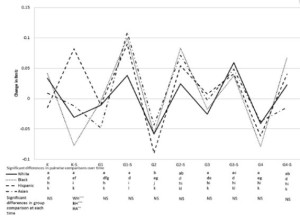By Amy Bohnert, PhD, and Carolyn Bates
Loyola University Chicago
Obesity among children and adolescents in the United States has reached unprecedented levels.1 Despite the common concerns about the role that schools play in providing healthy environments, research shows that youth can actually gain weight twice as fast during the summer months as during the rest of the calendar year.2 This is particularly problematic for low-income families, who often find it difficult when the “school faucet turns off” during the summer months to support children with the same level of resources that is provided during the school year.3
A recent study indicated that weight gain during the elementary school years occurs primarily during the short span of summer break.4 Indeed, children’s body mass index (BMI) in that study decreased by 1.5 percentile points during the school year, only to increase by 5.2 percentile points over the summer months.4 This accelerated weight gain during the summer is most pronounced among minority youth.2,4
This figure (right), from Moreno and colleagues (2015), suggests that summertime weight gain (as represented by the spikes in the G*-S columns) starts for all ethnic groups during the summer following 1st grade and is less pronounced for white children.5
The cumulative costs associated with summertime weight gain are staggering. What can be done to avoid this summertime slide? Recent findings point to a promising solution: provide youth with structure during the summer months. This structure comes in two forms: 1) summer programming and 2) family rules and routines.
Evidence suggests that summer programming that offers structured activities for extended periods of time appears to protect against weight gain. In fact, in a recent study, adolescents whose summers involved regular participation in organized, structured activities were found to have significantly lower BMIs than youth whose summer care arrangements consisted solely of parent care without organized activities and care by other adults.6 Moreover, summertime arrangements that include involvement in organized activities appear to have long-lasting positive effects on youth, including lower BMIs and increased social-emotional functioning the following school year.7
Family rules and routines are additional forms of structure that are essential to maintaining a healthy weight over the summer months. During the school year, schools impose some degree of structure over meals and activity, while families may impose regular bedtimes for children who need to wake up early for school. During the summer, on the other hand, families may relax rules about bedtimes, mealtimes and snacking. However, these very rules and routines have been shown to promote health and serve as protective factors against the development of obesity.8,9 In the absence of such rules and routines, children sleep for shorter amounts of time,10 eat less healthfully,11 and engage in significantly less physical activity,12 all of which serve as major risk factors for weight gain.
 There are two ways in which CLOCC partner organizations can address summertime weight gain. The first is by encouraging families to have their children enroll in and attend summer programs. What kind of summer programming gives youth and families the most bang for their buck? High-quality programs offering opportunities for academic or personal enrichment, along with health-promoting environments, are ideal. Evaluations of local organizations have suggested that programs like the YMCA Summer Learning Program or Chicago-based Girls in the Game can offer the kind of structure kids need. For organizations that do not have evaluation data available, families can judge the quality of a program based on a few key features that have been identified in the after-school programming literature. Strong programs are explicit about their goals. They implement activities that focus on promoting those goals while getting youth actively involved.13 Additionally, research supports that, regardless of goals, the best programs are those that follow the SAFE acronym: “SAFE” programs teach and promote learning in a Sequenced fashion, keep kids Active and Focused, and are Explicit in their mission.14
There are two ways in which CLOCC partner organizations can address summertime weight gain. The first is by encouraging families to have their children enroll in and attend summer programs. What kind of summer programming gives youth and families the most bang for their buck? High-quality programs offering opportunities for academic or personal enrichment, along with health-promoting environments, are ideal. Evaluations of local organizations have suggested that programs like the YMCA Summer Learning Program or Chicago-based Girls in the Game can offer the kind of structure kids need. For organizations that do not have evaluation data available, families can judge the quality of a program based on a few key features that have been identified in the after-school programming literature. Strong programs are explicit about their goals. They implement activities that focus on promoting those goals while getting youth actively involved.13 Additionally, research supports that, regardless of goals, the best programs are those that follow the SAFE acronym: “SAFE” programs teach and promote learning in a Sequenced fashion, keep kids Active and Focused, and are Explicit in their mission.14
A second way in which CLOCC partners can support families is by educating families about household/family structure through workshops, trainings, individual counseling and advising, articles in newsletters and more. Such education should focus on the kinds of family structures that can help children to avoid the summertime slide. It is essential that parents be educated on the importance of maintaining rules and routines around bedtimes, meals and physical activity, and taught how to implement and enforce such rules and routines. Although it has not yet been studied, it is highly probable that parents will be more likely to enforce family rules around bedtime if their child has to get up to attend a program during the summer months. As a community committed to health and well-being of children, we play a vital role in advocating for the best ways to keep “the faucet turned on” for the children who need it most.
A sample of resources available this summer in Chicago include:
– The LunchStop program will serve meals outdoors Monday-Friday beginning June 23rd. View a map of locations here. An initiative of Chicago Public Schools, LunchStop also welcomes partner organizations to engage attendees in wellness programming. Contact Mariah VanErmen at mlvanermen@cps.edu for details.
– The Illinois State Board of Education’s Summer Food Service Program (SFSP) was instituted to provide nutritious meals to children during the summer months when school is not in session. The program is funded by the United States Department of Agriculture (USDA) and administered by the ISBE.


